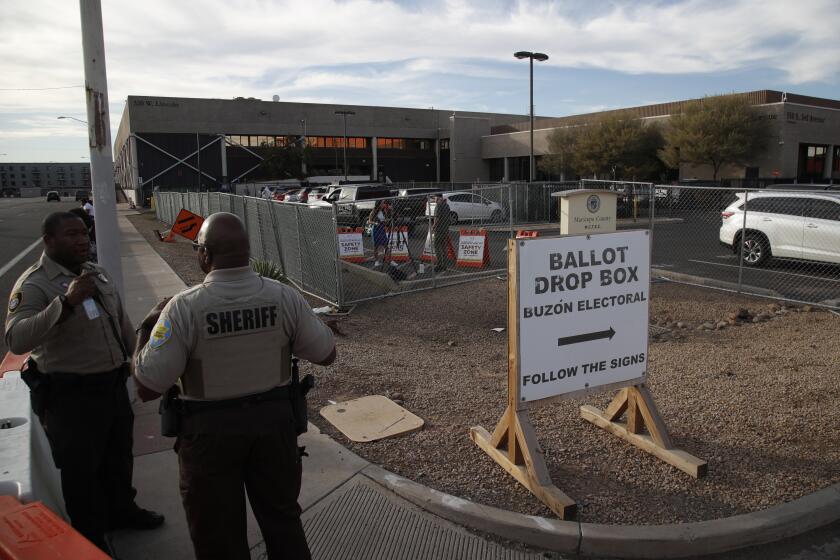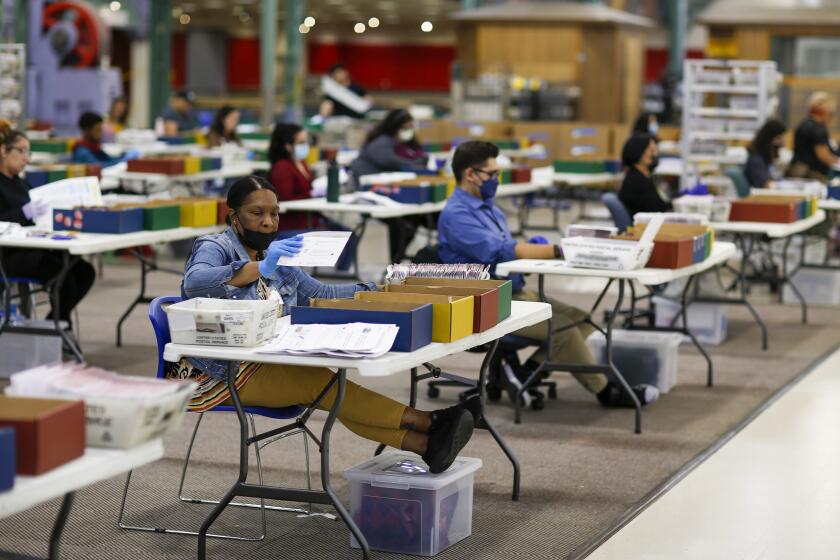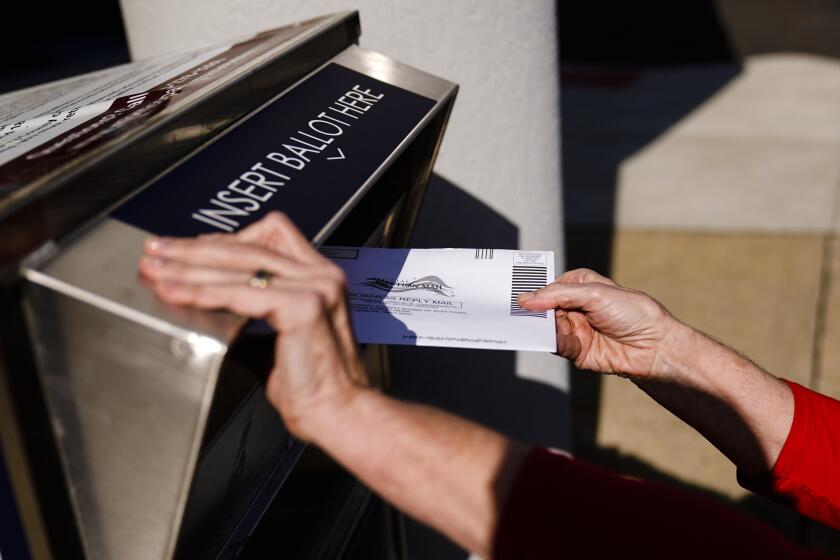Lawsuits over 2022 midterms results could extend well after Tuesday’s elections
- Share via
WASHINGTON — A deluge of legal challenges over the results of the 2022 midterm elections could be launched after the polls close in several states, with lawsuits expected in multiple races that could determine which party controls the House or Senate.
More than 100 lawsuits have already been filed across the country in the days ahead of Tuesday’s elections. And with different rules in each state dictating when vote-by-mail ballots can be counted and the deadline by which they have to be received, uncertainty is expected for days if not weeks after the midterms .
“We shouldn’t be surprised if on election night Republicans in [some] states have large leads. But then those leads shrink by Wednesday as mail ballots are counted. And when this happens, we’ll likely see election deniers claiming that mail ballots are tainted and filing lawsuits to throw out mail ballots,” said George Washington University law professor Spencer Overton, who specializes in voting rights and legal actions to disqualify ballots.
With so many election deniers running for office this year— a CBS News review of every federal and statewide race found that more than half of all GOP candidates on the ballot have raised doubts about the validity or integrity of the 2020 election — the chances are high that some of those who lose will refuse to concede and then sue over the results. Expect demands from candidates aligned with former President Trump that local officials finish counting ballots on election day, which is not required by law in any state.
Christina Baal-Owens, the executive director of Public Wise and the Insurrection Index, which is tracking candidates who were at the Capitol on Jan. 6, 2021, or who deny that President Biden won the 2020 election, said they at minimum expect litigation in Arizona, Georgia, Michigan, North Carolina and Pennsylvania.
“The expectation is that a lot of election deniers ... are going to declare victory regardless of what the vote count is on election day,” she said.
Despite pushes by conspiracy theorists and far-right groups to discredit the electoral process, Arizona election officials have expressed optimism and pride in the work they’ve done leading up to Tuesday.
Trump-backed Kari Lake, Arizona‘s Republican nominee for governor, announced last week that she was “bringing in the big guns” — California attorney and Republican National Committee member Harmeet Dhillon — to monitor complaints of irregularities on election day. Dhillon’s law firm is assisting Trump with a subpoena from the House committee investigating the Jan. 6, 2021, Capitol insurrection.
NAACP General Counsel Janette McCarthy Wallace said she expects litigation over the legitimacy of ballots to be filed across the country, not just in key states.
“I wouldn’t be surprised if other states have to face the same sort of lawsuits,” she said. “It appears to be a widespread effort to, in the NAACP’s mind, to disenfranchise voters.”
Experts are also watching for any moves from officials who previously refused to accept election results. In the primary elections this year, officials in Pennsylvania, Nevada and New Mexico initially refused to certify the results. All eventually abandoned their battles and certified after threats of lawsuits — and, in one case, a hand recount. That could also delay state certification of election results.
Overton said he expects lawsuits to touch every aspect of voting, including where ballot boxes are placed and whether election officials can notify voters about problems with mail-in ballots, such as a missing signature or address, and allowing voters to “cure” or fix them.
The overwhelming shift to vote-by-mail ballots fundamentally altered how Californians participate in elections. Ballot tabulation can extend for weeks afterward.
Most states finish counting election day and early, in-person votes before they’re done tabulating mail ballots. Democrats have traditionally been more likely to embrace voting by mail. Trump and his allies have spent months urging Republicans to vote in person on election day, which could amplify the so-called red mirage — a phenomenon in which it appears Republican candidates are initially ahead prior to a count of absentee or mail ballots — by making the gap between the initial results when the polls close and the results when all the votes are counted much wider.
Litigation is already being pursued at a fast clip. The Associated Press reported Oct. 27 that more than 100 lawsuits had already been filed over mail-in voting, early voting, voter access, voting machines and access for partisan poll watchers.
In Pennsylvania, thousands of mail-in ballots were set aside after the state Supreme Court agreed with the Republican National Committee that election officials should not count ballots if the voter neglected to put a date on the outer envelope — even if the ballots arrived before election day. Progressive groups have challenged that decision in federal court as a violation of the Civil Rights Act.
State statutes govern how long election officials have to certify election results, including a timeline by which lawsuits must be brought to contest them.
“Most of these lawsuits are not going to be settled in a day. But most of the time, they’re resolved quickly compared to other lawsuits,” Overton said.
The Justice Department is sending monitors to two dozen states to try to ensure compliance with federal voting rights laws in the midterm elections.
Some conservatives see 2022 as a dress rehearsal for challenges to come in the 2024 presidential election, Overton said, and as a chance to educate lawyers, poll watchers and monitors about how elections work and what legal actions might be the most successful.
“Part of this is about 2022. But part of it is that this is the last federal election before 2024 and they want to be ready in terms of preemptive strikes with regard to litigation,” he said.
More to Read
Get the L.A. Times Politics newsletter
Deeply reported insights into legislation, politics and policy from Sacramento, Washington and beyond. In your inbox twice per week.
You may occasionally receive promotional content from the Los Angeles Times.














